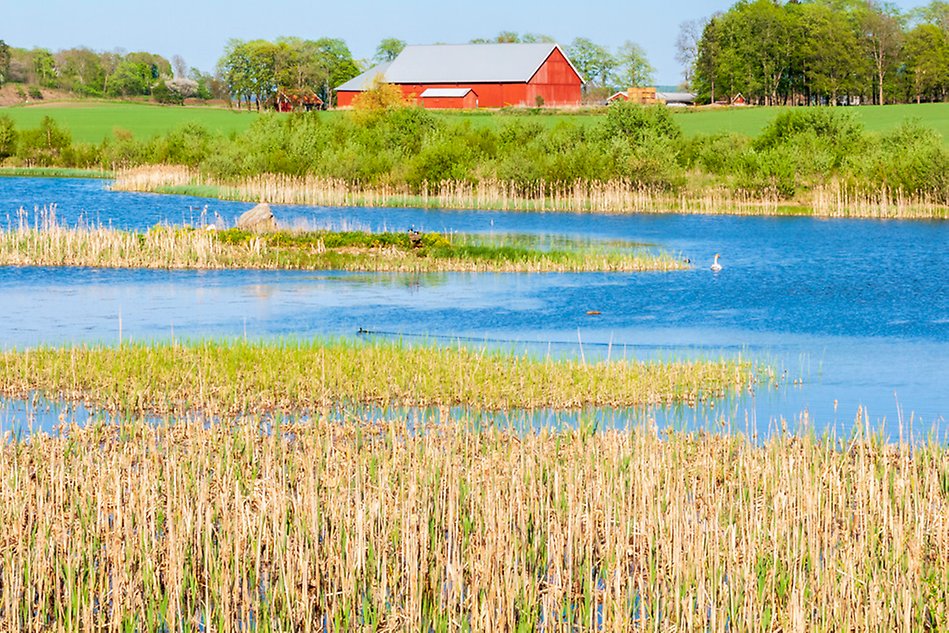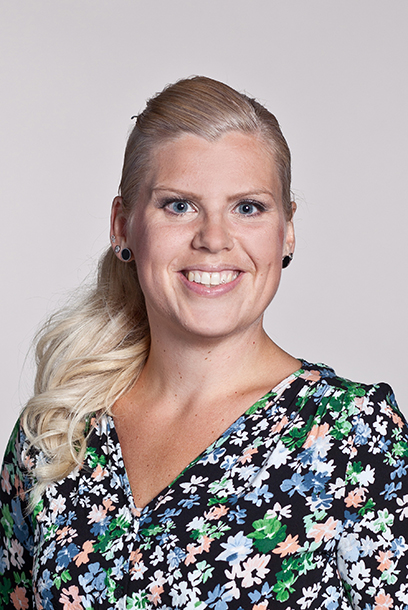Agricultural companies are key players in sustainability
By investigating how innovation can lead to sustainable changes in agricultural business models, Anna Hansson, who recently defended her doctoral thesis in innovation science, aims to support efforts towards a greener future in the agricultural sector. The hope is that this will result in better alignment between the ambitions of agricultural entrepreneurs and society’s sustainability goals.

“We could have a system where the society instead compensates agricultural businesses for the quantified environmental benefits their measures actually produce. This would mean that each unit of environmental benefit receives specific compensation, which would appeal to production-oriented agriculture.”
Anna Hansson
In her research, Anna Hansson strives to create a future where agriculture is a key player in food production and a role model for sustainability. She focuses on water-related environmental measures and fostering harmony between such initiatives and the economic profitability of farming. By exploring the obstacles and driving forces underlying the support of innovative business models, Anna Hansson aims to demonstrate how agriculture can benefit from the values inherent in water-related measures.
“For instance, this may involve supporting farmers in establishing wetlands. This can contribute to a more balanced water flow, preventing floods during rainy periods or preserving water in the landscape during dry periods. Such measures can impact the harvest’s quantity and quality,” says Anna Hansson.
Uncertainty regarding environmental measures
Agriculture is crucial for food production and plays a significant role in promoting economic, environmental and social sustainability. However, farmers face a challenge in balancing their interest in sustainability with their primary focus on food production.
“From society’s perspective, there is a demand for ecosystem services from water-related environmental measures that reduce greenhouse gas emissions and improve conditions for water quantity and quality. But even though many agricultural entrepreneurs have a genuine interest in sustainability issues, they tend to prioritize value creation from food production,” Anna Hansson elaborates and continues: “One explanation is the lack of market demand for sustainable value that benefits the public interest, creating uncertainty among farmers about integrating water-related environmental measures into their current business models. There is uncertainty about how to incorporate these measures into production and profitability.”
Coordinators driving force towards change
Through her research, Anna Hansson has identified and explored barriers and driving forces to better understand the farmers’ businesses’ motives to integrate sustainability aspects into their business models. By facilitating this transition, business models undergo an innovative process to include sustainability measures. Publicly funded coordinators play a central role in this process.
“These coordinators can assess local conditions, identify needs and resource availability and establish contacts with stakeholders aligned with the strategic plans for corporate environmental efforts,” Anna Hansson explains.

In January, Anna Hansson defended her thesis “Get it off the ground – Facilitating water-related environmental measures to support agricultural managers in business model innovation processes for sustainability”.
Increased understanding leads to sustainable solutions
By fostering an enhanced understanding of both farmers’ value intentions, in other words, the values and principles guiding their work, and the coordinators’ role, Anna Hansson’s aim with her research is to initiate innovation processes that lead to the development of more sustainable business models.
The research provides valuable insights into how agriculture can become more sustainable through sustainable corporate commitments. Anna Hansson explains that before work on these commitments begins, farmers undergo a preparatory phase, a pre-initiation phase, where their value intentions are crucial to initiating innovation processes. These processes involve changes in business models towards sustainability. The value intention becomes evident through how farmers perceive themselves as value creators, their challenges in finding new sustainability values, and their focus on profitability and actions that facilitate production.
“My research enhances the understanding of how the initiation of innovation processes for sustainability can be stimulated so that more comprehensive and long-term sustainability commitments are included in business models. This is done by including value intention in the pre-initiation phase,” Anna Hansson explains and continues emphasizing the importance of coordinators.
“The research also shows that publicly funded coordinators can facilitate the initiation of the innovation process of business models for sustainability by promoting the implementation of water-related environmental measures and creating synergies between sustainability and business aspects. Furthermore, they adapt their approach to the needs of farmers, in other words, value intentions. This promotes independence and trusting relationships. Through structured networks, coordinators also facilitate knowledge exchange between stakeholders at various levels of society.”
New forms of compensation
One conclusion drawn from Anna Hansson’s research is that farmers who take the initiative to implement water-related environmental measures, regardless of the extent, are more likely to implement more such measures in the future.
“There are individual differences among farmers regarding interest in environmental measures, but they share a production focus. This underscores the importance of receiving support to include environmental and sustainability benefits as part of production and business models to take the first step and get started,” Anna Hansson says.
With her research, Anna Hansson sees new opportunities to design business models that benefit agricultural enterprises economically and generate significant societal value. A key aspect is that today’s compensation systems often compensate agriculture economically for implementing sustainable water management measures. Still, there is a lack of systematic monitoring of the actual environmental benefits of such measures. Anna Hansson proposes a change in how compensation is distributed.
“We could have a system where the society instead compensates agricultural businesses for the quantified environmental benefits their measures actually produce. This would mean that each unit of environmental benefit receives specific compensation, which would appeal to production-oriented agriculture. Through this system, farmers would have incentives to optimize their environmental measures to maximize the production of environmental benefits,” Anna Hansson suggests.
“In this way, agriculture would not only produce food and energy crops but also be an active provider of environmental and sustainability benefits, benefiting both enterprises and society at large.”
Continuing sustainability efforts in new constellations
Anna Hansson defended her doctoral thesis in mid-January and is already engaged in new projects and challenges.
“Next, a new project awaits, where my research group, through the Swedish Energy Agency’s initiative ‘MESAM – Human, Energy System, and Society,’ will research promoting circular flows in industrial symbioses. The focus is on the production, use and residual flows of biogas. Here, too, farmers are included in the research as they can produce biogas, provide substrates for biogas production, and use the residues as fertilizer on their fields,” Anna Hansson explains.
The research group will examine the participation of agricultural enterprises together with other industries and companies. Anna Hansson sees this as an opportunity to deepen her knowledge from her previous research on how to facilitate and promote sustainability transition and business model development.
Text: Anna-Frida Agardson
Picture: iStock
Portrait picture: Magnus Karlsson
Collaboration partners
Anna Hansson has completed her research studies within various externally funded research projects and has been active in several networks nationally and internationally, funded by the EU, Formas, and the Swedish Agency for Marine and Water Management. The network within LEVA Halland – Local Engagement for Water – which is part of the Swedish Agency for Marine and Water Management’s initiative to enhance water quality and biological diversity, has been significant for research on facilitating water-related environmental measures.
About Anna Hansson
What is your educational background?
“I completed the bachelor’s programme in Environmental and Health Protection, which was previously offered here at the University, as well as the master’s programme in Applied Environmental Science, also here at Halmstad University.”
When did you come to Halmstad University?
“I started as a student in 2005 and then began working here in 2010 when I was hired as a research assistant within the research network Wetland Centre. That position later evolved into a lecturer position in environmental science.”
Why did you choose Halmstad University for your doctoral studies?
“I had been conducting research and participating in various research projects for several years as part of my lecturer position, so when the opportunity to start doctoral studies arose, thanks to the doctoral programme in Innovation Science and the strategic focus on green innovation, it felt like the next natural step to take.”
When and how did your interest in your research topic begin?
“It emerged during my bachelor’s studies when I started to get a deeper understanding of the importance of the people, and in my case, the entrepreneurs, behind decisions and sustainability measures. There are so many good solutions, innovative ideas, and environmental measures. But if we don’t know what motivates entrepreneurs to adopt and implement them, it’s still difficult to drive the sustainability transition at the pace we need. I’ve always had a practical focus. I want to understand how research findings, such as how wetlands should be designed as effectively as possible or the role biogas can play in agriculture, are received and can be packaged to promote implementation.”
About the doctoral defence
The dissertation took place on January 19, 2024.
Chairperson of the defence: Professor Håkan Pettersson, Halmstad University
Opponent: Associate Professor Richard Fergusson, Swedish University of Agricultural Sciences
Examination board: Professor Jonas Gabrielsson, Halmstad University, Associate Professor Helena Ranängen, Luleå University of Technology, Associate Professor Malin Gawell, Södertörn University
Supervisor: Professor Jeaneth Johansson, Halmstad University
Deputy supervisors: Associate Professor Eja Pedersen, Lund University, Lecturer Niklas Karlsson, Halmstad University
More information
Research at the School of Business, Innovation and Sustainability
Halmstad University establishes new research programme to meet sustainability challenges
Anna Hansson’s doctoral thesis: Get it off the ground – Facilitating water-related environmental measures to support agricultural managers in business model innovation processes for sustainability External link.
External link.
På svenska
Lantbruksföretagen nyckelaktörer inom hållbarhet External link.
External link.

